Ata-ul-Haye Nasir, Al Hakam
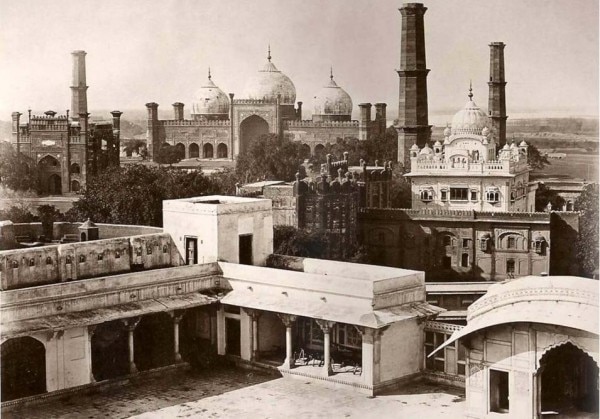
The city of Lahore has a great significance in the history of Ahmadiyyat, primarily due to the fact that it was visited multiple times by Hazrat Mirza Ghulam Ahmadas, the Promised Messiah and Mahdi. Furthermore, Huzooras spent the last few days of his life in this very city, where he wrote his last book, Paigham-e-Sulh — A Message of Peace.
Similarly, Hazrat Musleh-e-Maud, Mirza Bashir-ud-Din Mahmud Ahmadra also graced this city with his presence on many occasions.
This article will present a glimpse of his visit to Lahore in 1927.
Departure from Qadian
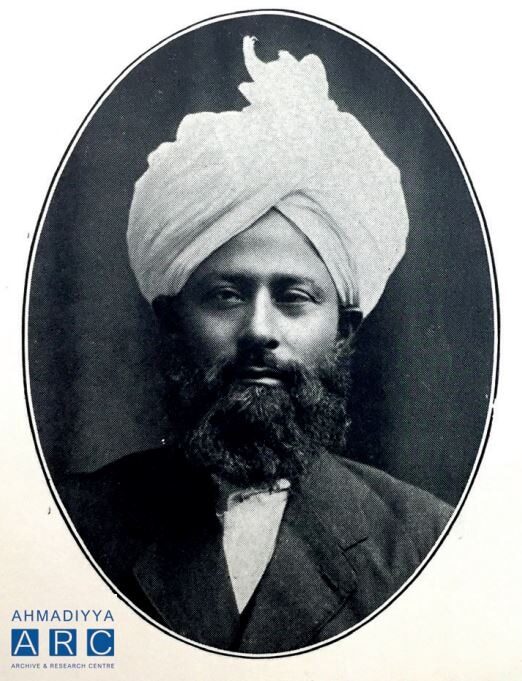
On 26 February 1927, Hazrat Musleh-e-Maudra departed from Qadian for his visit to Lahore. Due to the fact that the train from Batala was delayed for around 45 minutes, while Huzoorra was standing at the platform, many people had the opportunity to meet him, including Bawa Kanshi Ram — Chief of Ghorewaha and a member of the District Board of Gurdaspur. The meeting continued until Huzoorra boarded the train, and most part of the discussion revolved around the political situation in India and some other topics. (Al Fazl, 1 and 4 March 1927)
Arrival at the Amritsar and Mughalpura Stations
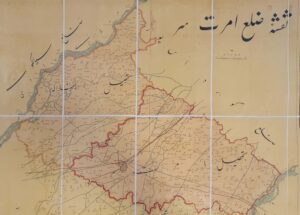
At the Amritsar Railway Station, Hazrat Musleh-e-Maudra granted an audience to a group of medical students, and then at the Mughalpura Railway Station, a huge number of Ahmadis from Lahore Cantonment, Moza‘ Ganj and Moza‘ Shahu Ki Garhi, welcomed Huzoorra with flower garlands. Most of them accompanied Huzoorra until the arrival at Lahore, and they had small flags in their hands that read:
سيّدنا! اھلاً وسھلاً ومرحباً
Hazrat Musleh-e-Maudra was welcomed at the Lahore Railway Station by members of the Jamaat, including Hazrat Sir Chaudhary Zafrulla Khanra, Hakim Muhammad Hussain Sahib Qureshi, Sheikh Abdul Hameed Sahib, and Hakim Muhammad Hussain Sahib Marham-e-Isa. Huzoorra then proceeded to the residence — house of Hazrat Sir Chaudhry Zafrulla Khan Sahibra, situated at Napier Road, Lahore. (Al Fazl, 4 March 1927, p. 2)
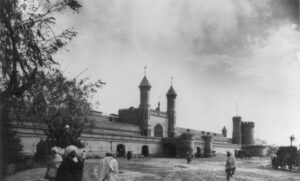
During this tour, Huzoorra addressed various gatherings and granted audiences to many dignitaries, including government officials and journalists.
Visit to the Punjab Legislative Council
On the afternoon of 28 February 1927, Hazrat Musleh-e-Maudra graced a session of the Punjab Legislative Council as a guest participant. (Al Fazl, 8 March 1927, p. 2)
An announcement published in The Civil and Military Gazette on 25 February 1927, provides some details of this session of the Council. The announcement stated under the heading “Punjab Council: Budget to be Presented on Monday”:
“At the meeting of the Punjab Legislative Council, to be held on Monday, February 28, at 2 p.m., the business will include the answering of questions and the presentation of the provincial budget for 1927-28 by the Hon. the Finance Member.” (The Civil and Military Gazette, 25 February 1927, p. 8)
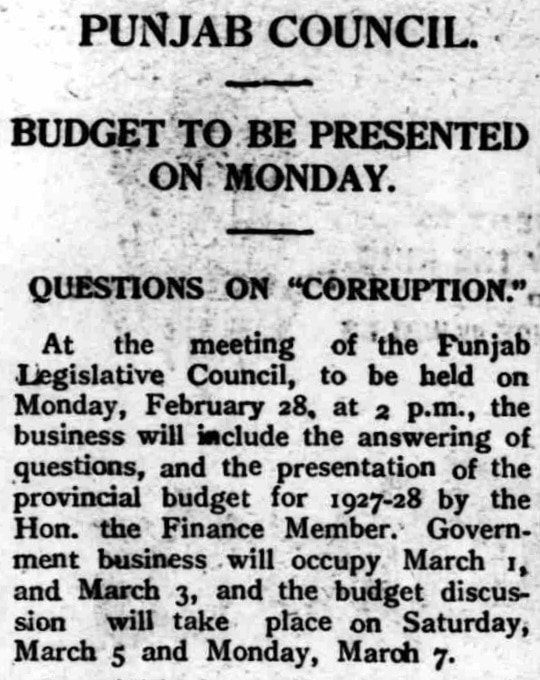
At that time, Hazrat Sir Chaudhry Muhammad Zafrulla Khanra was also an elected member of the Punjab Legislative Council. (The Punjab Parliamentarians: 1897-2013, p. 64, published by the Provincial Assembly of the Punjab, Lahore, Pakistan, 2015)
It is important to note that the Punjab Legislative Council was disassembled in 1936 and succeeded by the Provincial Assembly of the Punjab.
Members of the Inter-Collegiate Association meet with Huzoorra
After the Maghrib prayer on the same day, the members of the Inter-Collegiate Association had the opportunity to meet with Hazrat Musleh-e-Maudra. During the meeting, the students asked various questions, including some fiqhi questions as well, which were answered by Huzoorra in detail. Huzoorra also granted them valuable guidance as to how they could carry out effective tabligh, i.e., preaching the message of Islam. Huzoorra said that it is not appropriate to preach to someone by suddenly telling them that Jesusas has passed away, since it is quite possible that they, God forbid, do not even believe in the existence of God. Thus, at first, you are required to befriend them and assess what kind of person they are, and then gradually preach to them according to their nature. (Al Fazl, 8 March 1927, p. 2)
Maulvi Syed Mumtaz Ali meets with Huzoorra
On 1 March 1927, Maulvi Syed Mumtaz Ali Sahib, author of Huqooq-e-Niswan and manager of the Tehzeeb-e-Niswan newspaper of Lahore, had the opportunity to meet with Hazrat Musleh-e-Maudra.
Syed Mumtaz Ali Deobandi (1860-1935) was an Indian Muslim scholar and an advocate for women’s rights in the late 19th century. He was an alumnus of Darul Uloom Deoband, the author of Huqooq-e-Niswan and the editor of Tehzeeb-e-Niswan.
During the meeting, various topics remained under discussion, such as the Islamic teachings of purdah. Maulvi Sahib also narrated two of his dreams about the Promised Messiahas. (Ibid.)
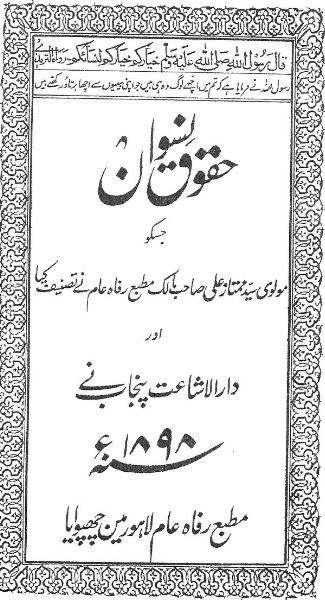
A bai‘at
After the meeting, a person named Mr Abdullah Makhan of Kapur Buildings Lahore pledged allegiance at the hands of Hazrat Musleh-e-Maudra. Huzoorra renamed him Muhammad Abdullah. He was earlier a Muslim but then converted to Christianity due to some misunderstandings. He is the brother of a well-known Christian debater, Padri Abdul Haq. (Ibid.)
Audience to some guests from the Frontier area
After this, some guests belonging to the Frontier area had the opportunity to meet Hazrat Musleh-e-Maudra. (Ibid.)
Ceremony at the Islamia College
On the same day, Hazrat Musleh-e-Maudra was invited to attend the prize distribution ceremony of the Islamia College, Lahore, where he was accompanied by Hazrat Hafiz Roshan Alira, Hazrat Mufti Muhammad Sadiqra, and Hazrat Chaudhry Fateh Muhammad Sayalra. The then Governor of Punjab, Sir William Malcolm Hailey (1872-1969) presided over the session. (Ibid.)
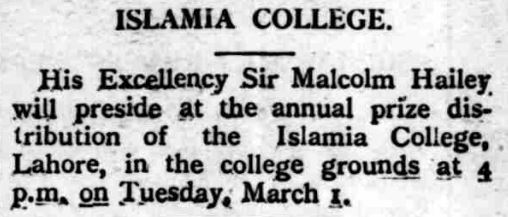
Speech at the Ahmadiyya Hostel
On the same evening, Hazrat Musleh-e-Maudra delivered a speech at the Ahmadiyya Hostel. (Ibid.)
Editor of the Paisa Akhbar, Lahore, meets with Huzoorra
On 2 March 1927, Maulvi Mahbub Alam Sahib, editor of the Paisa Akhbar of Lahore, had a meeting with Hazrat Musleh-e-Maudra. During this 30-minute meeting, various topics were discussed, such as the Hindu-Muslim relations and the Shuddhi Movement.
During the meeting, Huzoorra shed light on the methods to bring unity among the Muslims, which he had advised during the early days of the Shuddhi Movement as well, and noted that the situation of the Muslims is continuing to worsen. Huzoorra discussed with Maulvi Sahib some ideas and plans that could help improve the social, economic, and religious conditions of Indian Muslims. (Ibid.)
Professor of the Islamia College and a member of the Punjab Legislative Council meet Huzoorra
At around 10:30 am, on the same day, Hazrat Musleh-e-Maudra granted audiences to various dignitaries, including a history professor at the Islamia College Lahore, Syed Abdul Qadir Sahib, a member of the Punjab Legislative Council, Mr Abdul Ghani Sahib, MA Barrister-at-Law, and a lawyer, Maulvi Ghulam Muhayyudin Kasuri. During these meetings, they asked various questions of Huzoorra which were answered in detail by him. The topics discussed included inter-religious tensions and the Islamic teaching about purdah. (Ibid.)
Lecture at the Bradlaugh Hall
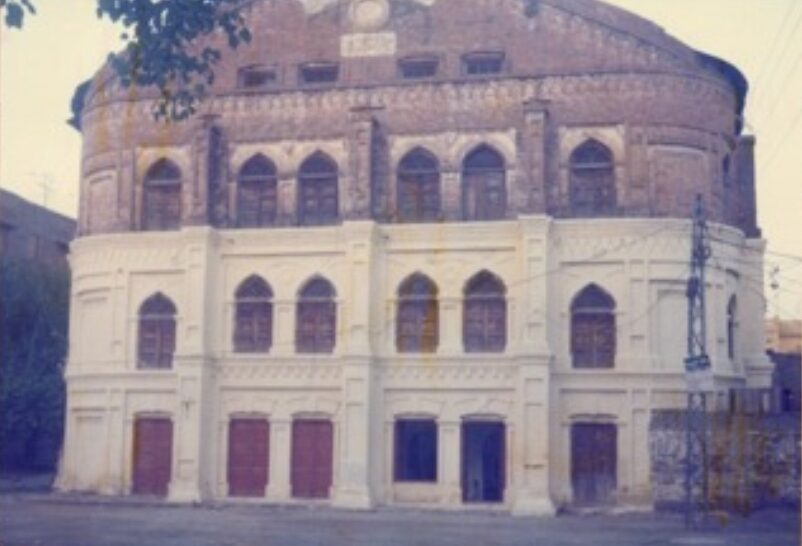
Hazrat Musleh-e-Maudra delivered a lecture at the Bradlaugh Hall in Lahore on 2 March 1927, titled “Hindu-Muslim Fasadat, Inka Ilaaj, Aur Musalmanon ka Ainda Tareeq-e-Amal”, i.e.,Hindu-Muslim Relations and the Future Line of Muslim Conduct. It was published in Al Fazl on 15, 18 & 22 March 1927.
The Civil and Military Gazette reported:
“Hindu-Muslim Relations
“Powerful Appeal For Mutual Toleration
“Hazrat Mirza Bashir-ud-Din Mahmud Ahmad, Head of the Ahmadiyya community, gave a very significant speech on ‘Hindu-Muslim Relations and the Future Line of Muslim Conduct,’ on Wednesday, March 2. The Hon. Sir Muhammad Shafi, K.C.S.I., was in the chair. The hall was packed to its fullest capacity and both communities were amply represented by leading members.
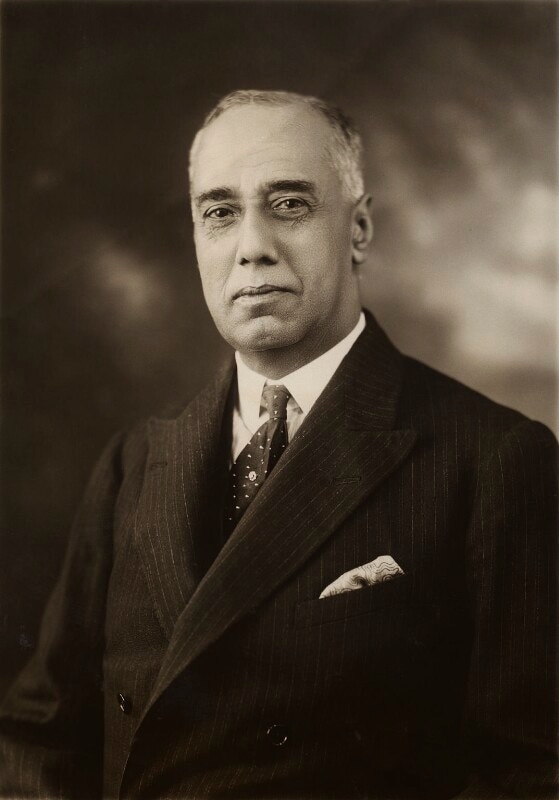
“The lecturer traced the origin of the Hindu-Muslim disturbances to two causes, viz., the absence of religious toleration and political injustice. Both of these traits in the Indian character, he remarked, were the inheritance of past Indian history, for which the present generation was not responsible. Therefore, instead of quarrelling amongst themselves and making matters worse, both communities should try to bury the past and make mutual efforts to forget and forgive. He appealed strongly to both communities, in the name of their respective religions and in the name of their country, to cultivate the virtues of broad-mindedness and fair play, which were greatly needed to develop national life in India. The lecturer was listened to with deep attention by an appreciative audience.” (The Civil and Military Gazette, 5 March 1927, p. 5)
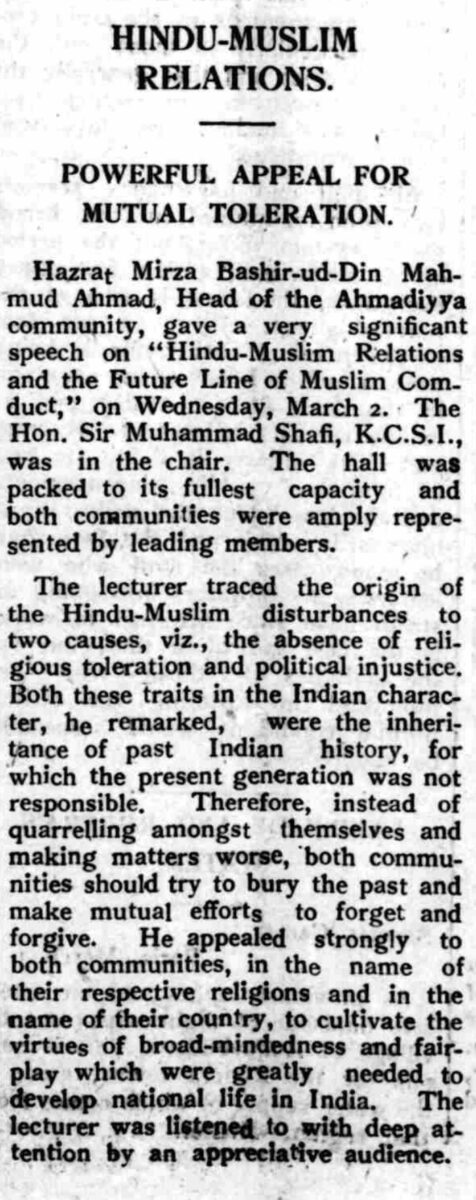
The details of this lecture have already been published in our article titled “‘Progress is impossible without peace’: Hazrat Musleh-e-Maud’s lecture at the Bradlaugh Hall in Lahore, 1927”, www.alhakam.org.
Professor from FC College, Lahore, meets with Huzoorra
On 3 March 1927, Bashir Ahmad Sahib, a professor from the Forman Christian College Lahore, had a meeting with Hazrat Musleh-e-Maudra. During that meeting, various Ahmadi and non-Ahmadi traders from Lahore were also present. The discussion revolved around the topics of trade, banking, interest, and inheritance.
Huzoorra said that the Indian Muslims were not making efforts to excel in the fields of trade, business, and manufacturing. Moreover, if they start any business, they do so without gaining sufficient experience or knowledge about that certain business. After this, the topic of inheritance came under discussion. Huzoorra said that the principle behind the Islamic teaching of inheritance is the continuous distribution of wealth so that everyone gets the opportunity to progress. (Al Fazl, 11 March 1927, p. 6)
In regards to interest, Huzoorra said:
“It is often claimed in regards to the interest that its prohibition hinders economic progress; however, it is wrong. We witness historically that, in addition to the [social] destruction as a result of the dealing of interest at the individual level, the collective dealings of interest have also caused ruin. Iran, Egypt and Oudh State in this country [India] took an interest and got ruined. When interest causes such a ruin, then how could it be said that ‘the Islamic commandment about its prohibition has hindered the way to progress.’ At least, it [dealing with interest] is certainly a harmful thing for anyone who belongs to Islam.” (Ibid.)
Huzoorra further said that Muslims are drastically regressing in the fields of trade and business. (Ibid.)
Huzoorra advised Professor Bashir Ahmad Sahib to establish an association of professors to consult as to which country a certain student should be sent to for training and experience and in which field. In this way, Huzoorra said, the Muslim youth may attain knowledge and experience in those fields and be fruitful for the country and nation. In response, the professor agreed to Huzoor’sra advice. (Ibid., p. 7)
Lecture at Habibia Hall, Islamia College
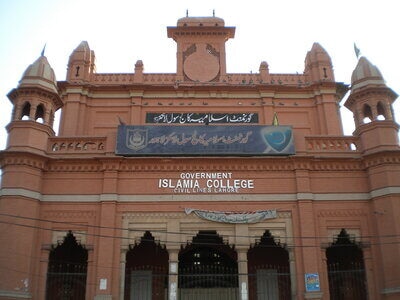
In the evening of the same day, Hazrat Musleh-e-Maudra delivered another lecture, titled “Mazhab Aur Science”, — Religion and Science, at the Habibia Hall of the Islamia College, Lahore. The session was presided over by Sir Muhammad Iqbal, and the lecture was organised by the Educational Union Islamia College. After some formal proceedings of the Educational Union, the session’s president introduced Hazrat Musleh-e-Maudra, which was followed by Huzoor’sra lecture.
The lecture lasted for around two and a half hours. After narrating various facts in relation to the universe and mankind, that have been mentioned in the Holy Quran and foretold by the Holy Prophetsa, Huzoorra stated that what science is discovering now, had been foretold by the Holy Quran and the Holy Prophetsa, 1400 years ago. Huzoorra proved that there is no contradiction between religion and science. (Mazhab Aur Science, Anwar-ul-Ulum, Vol. 9, pp. 495-520)
During this lecture, Huzoorra said:
“Religion is the name of those truths that relate to the nearness of Allah, and their knowledge is granted by the Creator of this Universe through revelation. And science is the name of those results which mankind derives through pondering over and contemplation.” (Mazhab Aur Science, Anwar-ul-Ulum, Vol. 9, p. 499)
Huzoorra continued:
“In light of this definition, there is no contradiction between religion and science, since religion is the Word of God, and science is the Act of God. […] Therefore, there is no contradiction between the Word and the Act of God. For this reason, there is no clash between religion and science either.” (Ibid.)
Towards the end of his lecture, Huzoorra advised the youth:
“Since you attribute yourself to Islam, you ought to study the religion of Islam and the Holy Quran and ponder over it. I assure you that science is not contradictory to religion. No true science could be contradictory to religion, and no true religion could be contradictory to science. If you ever doubt a certain matter, present it to me. I will tell you that there is no scientific principle and true philosophy that is contradictory to Islam. You have been granted the best religion; thus, you should value it. […] You are required to value and respect your religion. You are required to instil within you the spirit of Islam, and then you will succeed in all of your efforts. You should read the Holy Quran and study it with contemplation. You are required to honour this Book, and to never ridicule its verses. […] Always remember that it comprises those disciplines that are superior to every civilisation of this world. If you truly adopt the teachings of Islam, you will achieve success in this world, both spiritually and worldly. The slogan of لَا اِلٰہَ اِلَّا اللہُ [there is none worthy of worship except Allah] will echo once again, and the majesty of Islam will once again be established in the world, as it happened 1300 years ago. Insha-Allah.” (Ibid., pp. 518-519)
After Huzoor’sra lecture, the president of the session, Sir Muhammad Iqbal, said:
“Such a knowledgeable speech has been listened to after a long time in Lahore. The way Mirza Sahib has deduced arguments from the Holy Quran’s verses, is particularly very nice.” (Al Fazl, 15 March 1927, p. 9)
Reception
After delivering the lecture, on 3 March 1927, Hazrat Musleh-e-Maudra visited the house of Khawaja Ghulam Muhayyuddin Sahib Kasuri, since he had invited Huzoorra to a reception. (Al Fazl, 11 March 1927, p. 7)
Visit to Kasur and a short speech
On 4 March 1927, Hazrat Musleh-e-Maudra went to Kasur, since Malik Ghulam Muhammad Sahib had invited him to visit his flour mills. The entourage also included Hazrat Hafiz Roshan Alira, Hazrat Chaudhry Fateh Muhammad Sayalra, Sheikh Yusuf Ali Sahib, and Maulvi Ali Ahmad Sahib.
On that occasion, Huzoorra also delivered a short speech. The gathering also included various non-Ahmadi Muslims, Hindus, and Sikhs.
During his speech, addressing the opponents of the Jamaat, Huzoorra said:
“If you desire to attain the mercy of God, then you are required to remove any kind of grudge and discrimination from your hearts. […] Moreover, cleanse your inner selves from malice and hate, and the prayer [اِہۡدِنَا الصِّرَاطَ الۡمُسۡتَقِيۡمَ, meaning ‘Guide us in the right path.’ (Surah al-Fatihah, Ch.1: V.6)] which you recite around 40 times on five occasions during a day, you are required to recite it from the depth of your heart. And since the meanings of sirat-e-mustaqim [the right path] are very vast, you ought to remember it while reciting these words [and pray] that ‘if Ahmadis are true, then guide us towards them.’” (Al Fazl, 11 March 1927, p. 7)
Audience to a Hindu youngster
After this speech, a Hindu youngster — who was well-educated and counted amongst the English-speaking people of Kasur — came to meet Hazrat Musleh-e-Maudra and discussed certain religious matters. (Ibid., p. 7)
Return to Qadian
Hazrat Musleh-e-Maudra returned to Qadian on 5 March 1927. (Al Fazl, 8 March 1927, p. 2)

